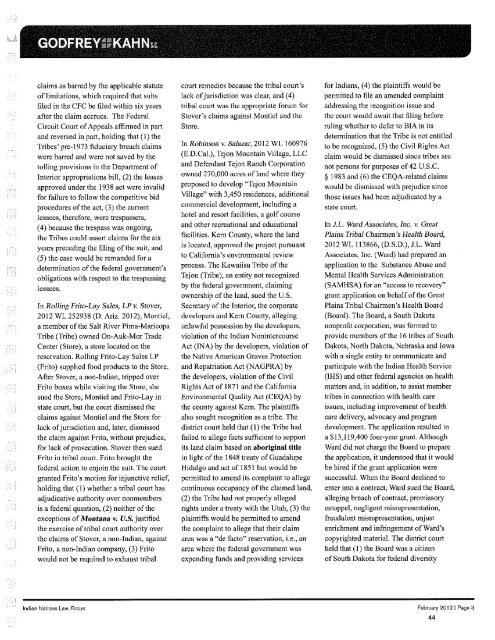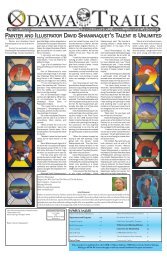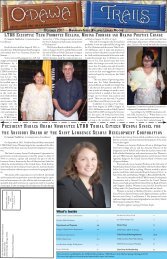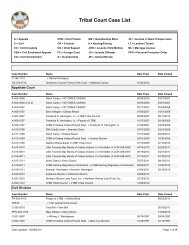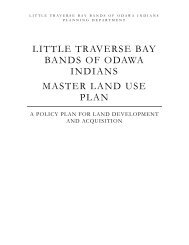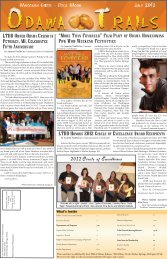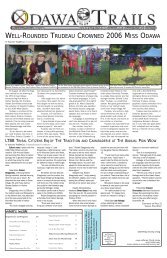United Tribes ) Michigan - Little Traverse Bay Bands of Odawa Indians
United Tribes ) Michigan - Little Traverse Bay Bands of Odawa Indians
United Tribes ) Michigan - Little Traverse Bay Bands of Odawa Indians
You also want an ePaper? Increase the reach of your titles
YUMPU automatically turns print PDFs into web optimized ePapers that Google loves.
claims as barred by the applicable statute<br />
<strong>of</strong> limitations, which required that suits<br />
filed in the CFC be filed within six years<br />
after the claim accrues. The Federal<br />
Circuit Court <strong>of</strong> Appeals affirmed in part<br />
and reversed in part, holding that (1) the<br />
<strong>Tribes</strong>' pre-1973 fiduciary breach claims<br />
were barred and were not saved by the<br />
tolling provisions in the Department <strong>of</strong><br />
Interior appropriations bill, (2) the leases<br />
approved under the 1938 act were invalid<br />
for failure to follow the competitive bid<br />
procedures <strong>of</strong> the act, (3) the current<br />
lessees, therefore, were trespassers,<br />
(4) because the trespass was ongoing,<br />
the <strong>Tribes</strong> could assert claims for the six<br />
years preceding the filing <strong>of</strong> the suit, and<br />
(5) the case would be remanded for a<br />
determination <strong>of</strong> the federal government's<br />
obligations with respect to the trespassing<br />
lessees.<br />
In Rolling Frito-Lay Sales, LP v. Stover,<br />
2012 WL 252938 (D. Ariz. 2012), Montiel,<br />
a member <strong>of</strong> the Salt River Pima-Maricopa<br />
Tribe (Tribe) owned On-Auk-Mor Trade<br />
Center (Store), a store located on the<br />
reservation. Rolling Frito-Lay Sales LP<br />
(Frito) supplied food products to the Store.<br />
After Stover, a non-Indian, tripped over<br />
Frito boxes while visiting the Store, she<br />
sued the Store, Montiel and Frito-Lay in<br />
state court, but the court dismissed the<br />
claims against Montiel and the Store for<br />
lack <strong>of</strong> jurisdiction and, later, dismissed<br />
the claim against Frito, without prejudice,<br />
for lack <strong>of</strong> prosecution. Stover then sued<br />
Frito in tribal court. Frito brought the<br />
federal action to enjoin the suit. The court<br />
granted Frito's motion for injunctive relief,<br />
holding that (1) whether a tribal court has<br />
adjudicative authority over nonmembers<br />
is a federal question, (2) neither <strong>of</strong> the<br />
exceptions <strong>of</strong> Montana v. U.S. justified<br />
the exercise <strong>of</strong> tribal court authority over<br />
the claims <strong>of</strong> Stover, a non-Indian, against<br />
Frito, a non-Indian company, (3) Frito<br />
would not be required to exhaust tribal<br />
Indian Nations Law Focus<br />
court remedies because the tribal court's<br />
lack <strong>of</strong> jurisdiction was clear, and (4)<br />
tribal court was the appropriate forum for<br />
Stover's claims against Montiel and the<br />
Store.<br />
In Robinson v. Salazar, 2012 WL 160976<br />
(E.D.Cal.), Tejon Mountain Village, LLC<br />
and Defendant Tejon Ranch Corporation<br />
owned 270,000 acres <strong>of</strong> land where they<br />
proposed to develop "Tejon Mountain<br />
Village" with 3,450 residences, additional<br />
commercial development, including a<br />
hotel and resort facilities, a golf course<br />
and other recreational and educational<br />
facilities. Kern County, where the land<br />
is located, approved the project pursuant<br />
to California's environmental review<br />
process. The Kawaiisu Tribe <strong>of</strong> the<br />
Tejon (Tribe), an entity not recognized<br />
by the federal government, claiming<br />
ownership <strong>of</strong> the land, sued the U.S.<br />
Secretary <strong>of</strong> the Interior, the corporate<br />
developers and Kern County, alleging<br />
unlawful possession by the developers,<br />
violation <strong>of</strong> the Indian Nonintercourse<br />
Act (INA) by the developers, violation <strong>of</strong><br />
the Native American Graves Protection<br />
and Repatriation Act (NAGPRA) by<br />
the developers, violation <strong>of</strong> the Civil<br />
Rights Act <strong>of</strong> 1871 and the California<br />
Environmental Quality Act (CEQA) by<br />
the county against Kern. The plaintiffs<br />
also sought recognition as a tribe. The<br />
district court held that (1) the Tribe had<br />
failed to allege facts sufficient to support<br />
its land claim based on aboriginal title<br />
in light <strong>of</strong> the 1848 treaty <strong>of</strong> Guadalupe<br />
Hidalgo and act <strong>of</strong> 1851 but would be<br />
permitted to amend its complaint to allege<br />
continuous occupancy <strong>of</strong> the claimed land,<br />
(2) the Tribe had not properly alleged<br />
rights under a treaty with the Utah, (3) the<br />
plaintiffs would be permitted to amend<br />
the complaint to allege that their claim<br />
area was a "de facto" reservation, i.e., an<br />
area where the federal government was<br />
expending funds and providing services<br />
for <strong>Indians</strong>, (4) the plaintiffs would be<br />
permitted to file an amended complaint<br />
addressing the recognition issue and<br />
the court would await that filing before<br />
ruling whether to defer to BIA in its<br />
determination that the Tribe is not entitled<br />
to be recognized, (5) the Civil Rights Act<br />
claim would be dismissed since tribes are<br />
not persons for purposes <strong>of</strong> 42 U.S.C.<br />
§ 1983 and (6) the CEQA-related claims<br />
would be dismissed with prejudice since<br />
those issues had been adjudicated by a<br />
state court.<br />
In J.L. Ward Associates, Inc. v. Great<br />
Plains Tribal Chairmen's Health Board,<br />
2012 WL 113866, (D.S.D.), J.L. Ward<br />
Associates, Inc. (Ward) had prepared an<br />
application to the Substance Abuse and<br />
Mental Health Services Administration<br />
(SAMHSA) for an "access to recovery"<br />
grant application on behalf <strong>of</strong> the Great<br />
Plains Tribal Chairmen's Health Board<br />
(Board). The Board, a South Dakota<br />
nonpr<strong>of</strong>it corporation, was formed to<br />
provide members <strong>of</strong> the 16 tribes <strong>of</strong> South<br />
Dakota, North Dakota, Nebraska and Iowa<br />
with a single entity to communicate and<br />
participate with the Indian Health Service<br />
(IHS) and other federal agencies on health<br />
matters and, in addition, to assist member<br />
tribes in connection with health care<br />
issues, including improvement <strong>of</strong> health<br />
care delivery, advocacy and program<br />
development. The application resulted in<br />
a $13,119,400 four-year grant. Although<br />
Ward did not charge the Board to prepare<br />
the application, it understood that it would<br />
be hired if the grant application were<br />
successful. When the Board declined to<br />
enter into a contract, Ward sued the Board,<br />
alleging breach <strong>of</strong> contract, promissory<br />
estoppel, negligent misrepresentation,<br />
fraudulent misrepresentation, unjust<br />
enrichment and infringement <strong>of</strong> Ward's<br />
copyrighted material. The district court<br />
held that (1) the Board was a citizen<br />
<strong>of</strong> South Dakota for federal diversity<br />
February 2012 I Page 3<br />
44


